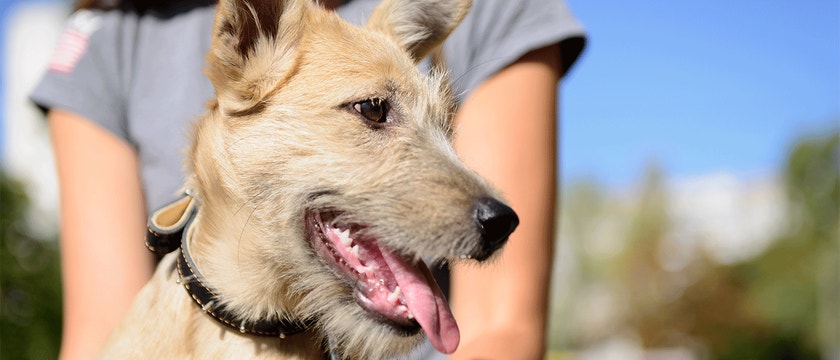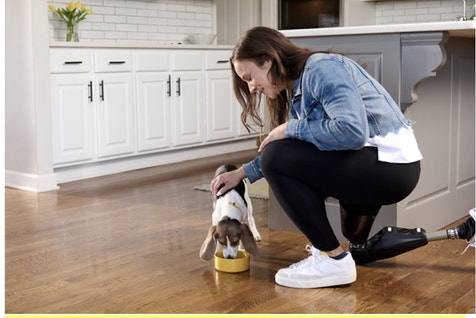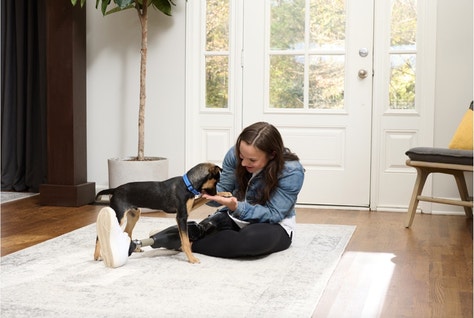
Where to Adopt a Dog: Finding Your Perfect Canine Companion
Finding Your Perfect Canine Companion
Welcoming a furry friend into your home is a heartwarming experience, and adopting a dog can be one of the most rewarding choices you make. Navigating this world of dog adoption requires careful consideration on a variety of topics: where to start looking to adopt a dog, the distinction between adoption and rescue, essential questions to ask at the shelter, red flags and what to expect during the adoption process.
How to Decide Which Dog is Right For You?
It might help to consider what kind of dog you're looking for before you decide where to adopt. Most dog rescue centers share photos of their animals online, so that once you've spotted a dog or puppy you'd like to potentially give a new home to, you can fill out the online application form.
It's easy to fall for a cute, fluffy face, but when choosing a rescue dog, there are several important factors to consider. These include personality characteristics, how much exercise the dog or puppy needs, whether it has any specific medical conditions, and how likely it is to happily coexist with other household members including children and other pets. It's important to pick a dog that will fit with your home, family, and lifestyle.
One consideration could be to adopt a retired service dog as a number of aspiring service dogs are withdrawn from training because they don't make the grade. But these canines can still make great family pets.
If you could offer a home to an older dog, then your perfect pet may be waiting for you at specialized voluntary organizations looking for people to provide a loving home to a furry senior, which are often ideal pets for first-time owners.
Still trying to figure out where to begin? Check out this article for more help on choosing the right dog for your family.
Adoption vs. Rescue: What's the Difference?
It's crucial to differentiate between dog adoption and rescue. Adoption typically involves rehoming dogs that may have been surrendered or abandoned, while rescue often focuses on saving dogs from dire situations, such as neglect or abuse. Both avenues offer opportunities to provide a loving home, but understanding the distinction can help you align your preferences with the proper process.
Deciding Where to Adopt a Dog
Adopting a dog is a decision that requires careful consideration as well as a genuine commitment to offering a loving and stable home for your new canine companion. This all starts with finding the right organization to adopt from.
Shelters:
Local shelters are vital hubs for dog adoption. These facilities rescue and care for animals, providing them with medical attention, vaccinations, and behavioral assessments. When you adopt from a shelter, you're often giving a second chance to a dog in need. In most cases these dogs are typically already spayed or neutered, vaccinated, and most likely microchipped for identification.
Breed-specific rescues:
For individuals with specific preferences regarding dog breeds, there are rescue organizations dedicated to particular breeds. These groups focus on rescuing, rehabilitating, and rehoming dogs of a particular breed, ensuring they find suitable homes where their unique needs and characteristics are understood.
Humane societies:
Humane societies are found in many cities and work toward the welfare of animals, including finding suitable homes for them. These organizations often have a diverse mix of dog breeds, breed mixes, and sizes, which make them excellent places to explore if you're open to various possibilities.
Pet adoption websites:
Online platforms like Adopt a Pet(open in new tab)
(opens in new window)(open in new tab)
offer convenient ways to search for dogs available for adoption. These websites provide detailed profiles and pictures of dogs, allowing you to narrow your search based on preferences such as size, age, and temperament.
Local animal control centers:
Municipal animal control or service centers may have dogs available for adoption. These facilities often take in stray or abandoned animals, and adopting from them can be a compassionate choice that helps to reduce the population of animals in need.
Pet events and adoption fairs:
Attending local pet events or adoption fairs can be a fun and interactive way to meet dogs available for adoption. These events bring together various rescue organizations, which allows potential adopters to interact with different dogs and find a suitable match in a more casual setting. At PEDIGREE®, we host adoption drive events from time to time - such as our 2023 PEDIGREE® Shelter Sunday and the One True Loyalty Program, in collaboration with Dollar General - to help people to find an ideal canine companion while saving money.
Why Does it Matter Where You Adopt a Dog From?
When you're on the hunt for a new fur buddy, it's important to keep your eyes peeled for any potential red flags that may indicate an organization's credibility and commitment to animal welfare. Here are a few things to think about to make sure you pick the perfect spot to adopt your pup:
Incomplete or vague adoption processes:
Be cautious if the adoption process lacks transparency or if the organization is unwilling to provide clear details about the steps involved. Reputable organizations typically have well-defined processes, including thorough screening, and follow-up support.
Inadequate medical records:
A trustworthy adoption organization will readily share comprehensive medical records of the animals in their care. This includes information about vaccinations, spaying/neutering, and any medical treatments or surgeries performed. If an organization is reluctant to provide such records, it raises concerns about the animal's health and the organization’s commitment to transparency.
Unwillingness to answer questions:
A reliable adoption organization should be open to answering all your questions about the pet you are interested in. If staff members are evasive or unwilling to provide information, it could be a sign that they have something to hide or are not genuinely invested in the well-being of the animals.
Unsanitary conditions:
The cleanliness of the facility is a direct reflection of the organization's commitment to animal welfare. If you notice unsanitary conditions, such as dirty cages, foul odors, or inadequate ventilation, it could indicate a lack of proper care and hygiene standards. A reputable adoption center will maintain a clean and safe animal environment.
Negative reviews or reports:
Before committing to adoption, research the organization online. Look for reviews from other adopters and check if there are any reports of malpractice or unethical behavior. Negative feedback or reports of mistreatment should be taken seriously and may serve as a warning sign.
Unrealistic promises:
Exercise caution if the organization makes unrealistic promises or guarantees about the behavior, health, or history of the animal. Credible shelters will provide realistic information about the pet, including any known behavioral issues or medical conditions.
Choosing the right organization is crucial for the well-being of both the dog and the adopting family. By staying informed, vigilant and aware of potential red flags, you can make a more educated and responsible decision when selecting a shelter or rescue.
Questions to Ask at the Shelter: Finding the Perfect Pup

We're all guilty of letting our hearts lead our heads. You may see a cute canine at your local rescue center and fall instantly in love. It's still important to know as much as possible about the pooch you're adopting to avoid any incompatibility or having to return your rescue. To help prevent this from happening, go with a list of questions ready to ask the staff when you first meet your potential pup. Here are a couple you might want to add to your list:
- How old are they?
- Do you have any information on their medical history?
- Do they have any special needs I need to be aware of?
- Do you have any information on their life before the shelter?
- Were they appropriately socialized as a puppy?
- How do they respond to unknown people, animals and objects?
- What kind of training have they had, or to what extent of training do they need?
These questions are just a starting point. Before visiting a shelter, sit down and compile a list of everything you need or would like to know for the best chance of meeting your match.
What Happens Once You’ve Found Your Perfect Match?
If you’ve seen a dog you like online, contact the shelter by phone or email to set up a meetup with your potential furry friend. At the meeting, you can hang out with the pup and even check out other dogs to make sure you're making the right choice. It’s common for pet parents to meet several dogs before making a decision. Once you find the perfect dog, you'll be asked to fill out an application form with information about you, your family, and where you live. This helps the adoption center figure out if the dog will be a good fit for you, and you for them.
Keep in mind, some rescues might want to visit your home to make sure it's suitable before you officially adopt. And if you've got other pets, they might want to see if everyone gets along. Check out this article(open in new tab)
(opens in a new tab)(open in new tab)
from Adopt a Pet—it's a handy guide for getting ready for a home visit.
Preparation is Key
Just like meeting the right partner or making a friend for life, finding the right dog requires positivity, patience, and diligence. By taking your time to find the right shelter or rescue and asking the right questions when you get there, you'll set the stage for a successful and fulfilling adoption journey. A well-informed decision will make for a happy, healthy, and harmonious life with your new furry friend.
Once you’ve decided where to adopt from, check out our Dog Adoption Prep Checklist with Adopt a Pet for all the must-haves to get you started.




